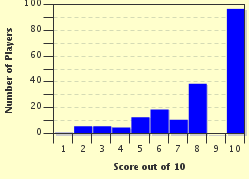Quiz Answer Key and Fun Facts
1. Female pharaoh of the Eighteenth Dynasty
2. Jewish orphan who became Queen of Persia
3. Built mausoleum for her brother-husband at Halicarnassus
4. Elaborately buried in Royal Cemetery of Ur
5. Led freedom movement in Vietnam against Chinese rulers
6. Queen of Iceni, led rebellion against Rome
7. Mother of Alexander the Great
8. First female ruler (Empress) of China
9. Greek lyric poet
10. Judge in Israel
Source: Author
ponycargirl
This quiz was reviewed by FunTrivia editor
NatalieW before going online.
Any errors found in FunTrivia content are routinely corrected through our feedback system.


